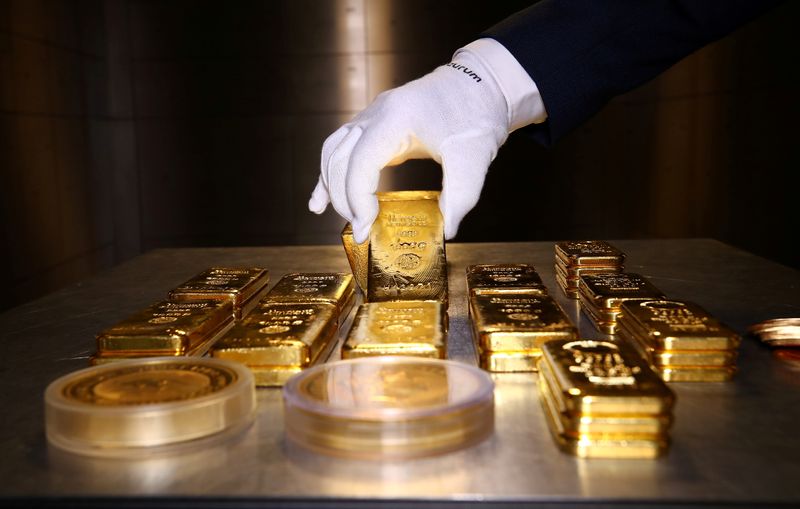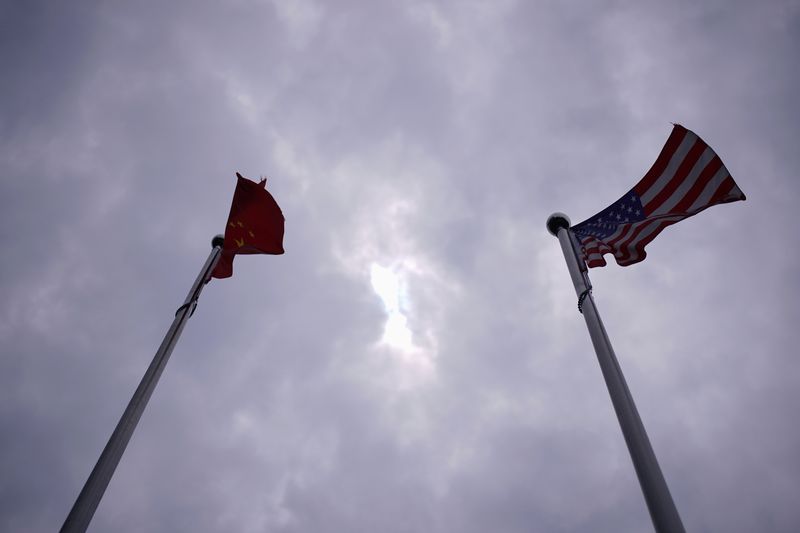By Marc Jones
LONDON (Reuters) - Gold soared to an all-time high on worsening ties between China and the United States, a weakening dollar and ultra-low interest rates on Monday, while stock markets looked uncertain before a corporate earnings deluge.
Europe's equity markets saw a subdued start, perhaps still hurting after their first weekly drop in four and as the euro's fastest gains since early 2016 took it through $1.17 [/FRX], but it was the precious metals surge that dominated.
Gold rose another 1.6% to a record high of $1,943 per ounce, surpassing its gains in September 2011. Silver climbed another 5.5% to take its July streak past 30%, which would be its best month on record.
A lot of factors were in play for markets, said Shafali Sachdev, the head of FX Asia at BNP Paribas (OTC:BNPQY) Wealth Management in Singapore, from U.S.-China tensions to a second wave of coronavirus outbreaks.
"If you look at the fact that the dollar's been higher yielding than many other currencies for quite a while, and with some of the benefits of that being eroded ... and also the continued demand for a safe haven, it all plays into gold's strengthening," she said.
"And at this point there doesn't seem any obvious factor that could help the trend to draw to a close."
European stocks cut some of their early losses after data from Germany showed an improvement in business morale, but it was going to be an effort to get out of the red.
Travel and leisure stocks were down 3%, with UK-based airlines and tour operators such as TUI AG,, Easyjet, British Airways owner IAG (LON:ICAG) falling 8% and to 13.5% after Britain imposed a 14-day quarantine on travellers returning from Spain, where coronavirus cases are rising again.
Asia was also choppy. A 10% rally in Taiwanese chipmaker TSMC helped some other tech shares across the region, after U.S. rival Intel (NASDAQ:INTC) saw its shares plunge more than 16% on Friday.
"Chipmaking machine makers may see reduced demand from Intel for now, but as the jump in TSMC shows, markets are not pessimistic about the semiconductor industry," said Yasuo Imanaka, chief analyst at Rakuten Securities.
Elsewhere, mainland Chinese shares gave up most of their early gains, with the CSI300 index closing up just 0.2%, after steep losses on Friday.
Japan's Nikkei fell 0.2%, though S&P500 futures steadied and were last up 0.4% in Europe. (N)
Global shares had lost steam late last week after Washington ordered China's consulate in Houston to close, prompting Beijing to close the U.S. consulate in Chengdu.
U.S. Secretary of State Mike Pompeo said Washington and its allies must use "more creative and assertive ways" to press the Chinese Communist Party to change its ways.
"U.S. President (Donald) Trump used to say China's President Xi Jinping is a great leader. But now Pompeo's wording is becoming so aggressive that markets are starting to worry about further escalation," said Norihiro Fujito, chief investment strategist at Mitsubishi UFJ (NYSE:MUFG) Morgan Stanley (NYSE:MS) Securities.
Graphic: Gold soars, dollar dips - https://fingfx.thomsonreuters.com/gfx/mkt/jbyvrkrzlpe/Gold%20all-time%20high.png
MORE STIMULUS
One key for markets this week will be earnings releases from the world's main tech companies. Facebook (NASDAQ:FB) reports on Wednesday, and Amazon (NASDAQ:AMZN), Apple (NASDAQ:AAPL) and Google (NASDAQ:GOOGL) are all due.
Hopes for a quick U.S. economic recovery are fading as coronavirus infections showed few signs of slowing. That means the economy could capitulate without fresh support from the government, with some of the earlier steps such as enhanced jobless benefits due to expire this month.
Investors hope U.S. Congress will agree on a deal before its summer recess. U.S. Treasury Secretary Steve Mnuchin said the package will contain extended unemployment benefits with 70% "wage replacement" -- but there are some sticking points.
Democrats, who control the House of Representatives, want enhanced unemployment benefits of $600 per week to be extended and look to much bigger stimulus compared with the Republicans' $1 trillion plan.
Concerns about the U.S. economic outlook have also started to weigh on the dollar. The dollar index dropped 0.5% to its lowest level in nearly two years.
The euro gained 0.5% to $1.1711, hitting a 22-month high, after a European agreement on a recovery fund last week supported sentiment toward the common currency.
Against the yen, the dollar slipped 0.5% to 105.605 yen, a four-month low while the British pound hit a 4 1/2-month high of $1.2832.
Oil prices were capped on worries about the worsening Sino-U.S. relations.
Brent futures slipped 0.05% to $43.32 per barrel. U.S. crude futures were flat at $41.29.

"The pressure is building on politicians to provide more stimulus as the Covid-19 outbreak continues across the Americas, with a second wave unfolding in Europe and Asia" said Jeroen Blokland, portfolio manager at Robeco.
